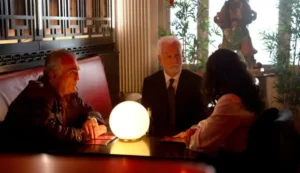Summary
A tedious and torpid love triangle that doesn’t make the most of its premise or dual timeline gimmick, A Girl and an Astronaut is lost in space.
Looking at Netflix’s description of A Girl and an Astronaut, you’d be forgiven for thinking it’s a much more interesting show than it ends up being. It has all kinds of juicy genre labels slapped on it – including “steamy”, which always helps – and a premise that seems, at first glance, like something pretty thought-provoking and engaging. Don’t be fooled, though. This Polish original series, directed by Bartosz Prokopowicz and written by Agata Malesinska, seems almost like an experiment into how sedate a sci-fi drama can get under the right conditions.
Mercifully running across six overlong episodes rather than eight or more, the story here is set in two distinct time periods. In 2022, we see young versions of Marta and her pilot suitors, Niko and Bogdan, meet and go through the motions of a torpid love triangle, while in 2052, we see Niko’s sudden return to Earth from a space mission kickstart a conspiratorial plot and some long-dormant feelings in Marta. None of this is as interesting as it sounds.
Niko’s return is complicated by the fact that he was supposed to be dead, with the agency behind the mission having declared as much to the world. Even 30 years on, he’s no older, which prompts some understandable questions. As the series unfolds, we begin to see how both halves of this narrative meet in the middle, though at no point do we ever get a sense of why we should care.
The early episodes, in particular, leave the 2052 plot frustratingly underdeveloped, focusing instead on saucier meet-cutes that are nonetheless rendered inert by the cliched presentation and thin characterization. That general disinterest in its characters blights A Girl and an Astronaut all the way through. Archetypes – carefree girl, arrogant young man, buttoned-up self-serious professional – do all of the heavy lifting, and the machinations of the plot in both eras have little effect on the interpersonal dynamics. There is little change and development, and very few decisions that seem to have been arrived at from a logical direction.
I wasn’t timing it, but I was nonetheless impressed by how quickly I stopped caring – certainly, before the story really got going, which, needless to say, is something of an obstacle. The whole thing is similarly burdened by the dual timelines. Unlike other shows that employ this gimmick, like the recent In Love All Over Again, also on Netflix, A Girl and an Astronaut differentiates between time periods lazily and poorly, obfuscating a relatively simple story with needless toing and froing. As a storytelling tool, it adds little, and there’s never any sense that the show is trying to do anything interesting with the idea.
There’s a sense that the show’s creators were overly confident in their visual effects, which are strong, and might have distracted from an insufficient human component if they weren’t so ultimately unimportant or infrequent. Sure, several sequences look nice, perhaps nicer than you’d expect in a streaming show, but they’re in service of a low-stakes plot and frustratingly inert characters. In the end, nothing coheres into a resonant story, and the whole thing remains as adrift as Niko himself, floating agelessly in the vast emptiness of space.
Read More:




